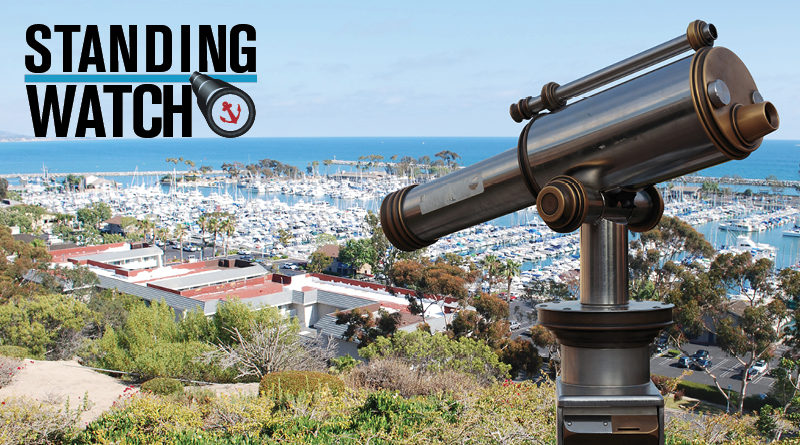Does California care about anglers and boaters?
Advocacy groups consistently boast economic impact of boating and fishing, but legislative efforts to support both industries continue to fail.
SACRAMENTO — The definition of insanity, according to a clichéd pop culture mandate, is repeating something over and over again but expecting different results. Are California’s anglers and boaters insane for pushing their respective legislators for policy changes and hoping for something other than a gubernatorial veto or legislative failure?
Those who have paid any attention to Sacramento these past few years should be aware of State Sen. Tom Berryhill’s repeated attempts to change California’s sportfishing licensing regime from a calendar-based fee to a 365-day fee. Each of Berryhill’s effort fizzled on the legislative floor, never even sniffing Gov. Jerry Brown’s desk for signature or veto.
Making it to Brown’s desk, of course, doesn’t necessarily mean a legislative victory is around the corner. Brown did veto Assembly Bill 1918 in mid-September. The bill sought to create the Office of Sustainable Outdoor Recreation. Creating such an office, legislators hoped, would help encourage getting more boaters out onto the water, be it to boat, fish or kayak.
Angling and boating industry leaders, of course, have regularly campaigned legislators and political executives to help them increase outdoor participation rates. Changing California’s fishing license system from a calendar to annual regime, angling advocates constantly argue, would help reverse a steady trend of declining recreational fishing participation. Members of the recreational boating lobby, meanwhile, recently cited various statistics to show those who navigate local and regional waterways make substantial contributions to the national economy.
The U.S. Commerce Department, for example, published a report stating boating and fishing as the top overall outdoor industries in 2016, based upon real gross output. Both industries were specifically responsible for $36.9 billion of real gross output in 2016, according to the Commerce Department report.
A separate report published by the American Sportfishing Association, or ASA, found the nation’s 49 million anglers spent $49.8 billion on gear and fishing trips.
Numbers are being presented to at least give the appearance of boating and fishing being vital cogs of the overall economy. Anglers and boaters, it could then follow, serve as valuable constituencies. Earning significant legislative victories wouldn’t seem like it would be much of a chore. Yet fishing license reform has yet to happen despite several valiant efforts. And the creation of a new statewide office specifically to promote outdoor recreational activities, such as kayaking or fishing, almost happened, but didn’t.
We can go one of two directions, here, with our questioning. The directions aren’t mutually exclusive – there is space for both concepts to co-exist. The conceptual questions are these:
- Who, in Sacramento, is looking out for boaters and recreational fishers?
- What responsibility does the boating and fishing industries have, respectively, to steer their own ships?
Brown, in his veto message of AB 1918, said the creation of the Office of Sustainable Outdoor Recreation would have been an added layer of unnecessary bureaucracy. An effort to limit bureaucracy within our government isn’t necessarily a bad thing, so Brown certainly has standing to make such an argument here. Perhaps there are other ways the state’s current bureaucracy can be used as a tool to promote outdoor recreational activities. Policy decisions, at the same time, aren’t made in a vacuum. It would be fair to question Sacramento’s support of anglers, boaters and other outdoor enthusiasts, in light of the combination of a recent stretch of boating/fishing friendly proposals not becoming codified.
The same could be said of recreational fishing interests within the state. Offering anglers a fishing permit system where their purchase is valid for a full 365 days has been implemented in several states already, yet California has maintained its current calendar regime. Anyone who buys a fishing permit here will see it expire on Dec. 31, regardless of when purchased. The fee does not change over time, so you’re paying the same fee for a permit that becomes less valuable as each day goes by – and efforts to change this regime has failed at least three times.
Statistics consistently show fishing participation rates in California have been dwindling since 1980, all while the price to drop a line in the state’s waters has been gradually increasing. Many in the angling world have stated California’s diminishing fishing participation could be reversed if we simply shifted to a 12-month licensing scheme. Attempts to make this proposal a reality in 2017 and 2018 have not been met with any pushback. So why have these proposals failed to make it out of the legislature? Could the state’s assistance actually complement the fishing industry’s efforts to revitalize angling in California?



Based on my personal experience, the state has lost out on my purchase of a fishing license for at least the last 5 years. I get busy and forget to get a license early in the year, during the year I would use one if I had it, and in late Fall I really would like to buy one, but won’t spend the money for only a couple of weeks of use. Maybe next year I’ll remember to get one, but I would definitely have purchased one each year if they were 12-month licenses, not calendar year licenses. I realize it sounds stupid, but that is the way it has worked for me.
Gee the state who want to make sure that surfers and swimmers are attacked by Great White Sharks does not want people to fish?
I say that they need to release Grizzly bear into Griffith Park and The Presidio.
Why should surfer and swimmer be the only one risking death while enjoying the out doors.